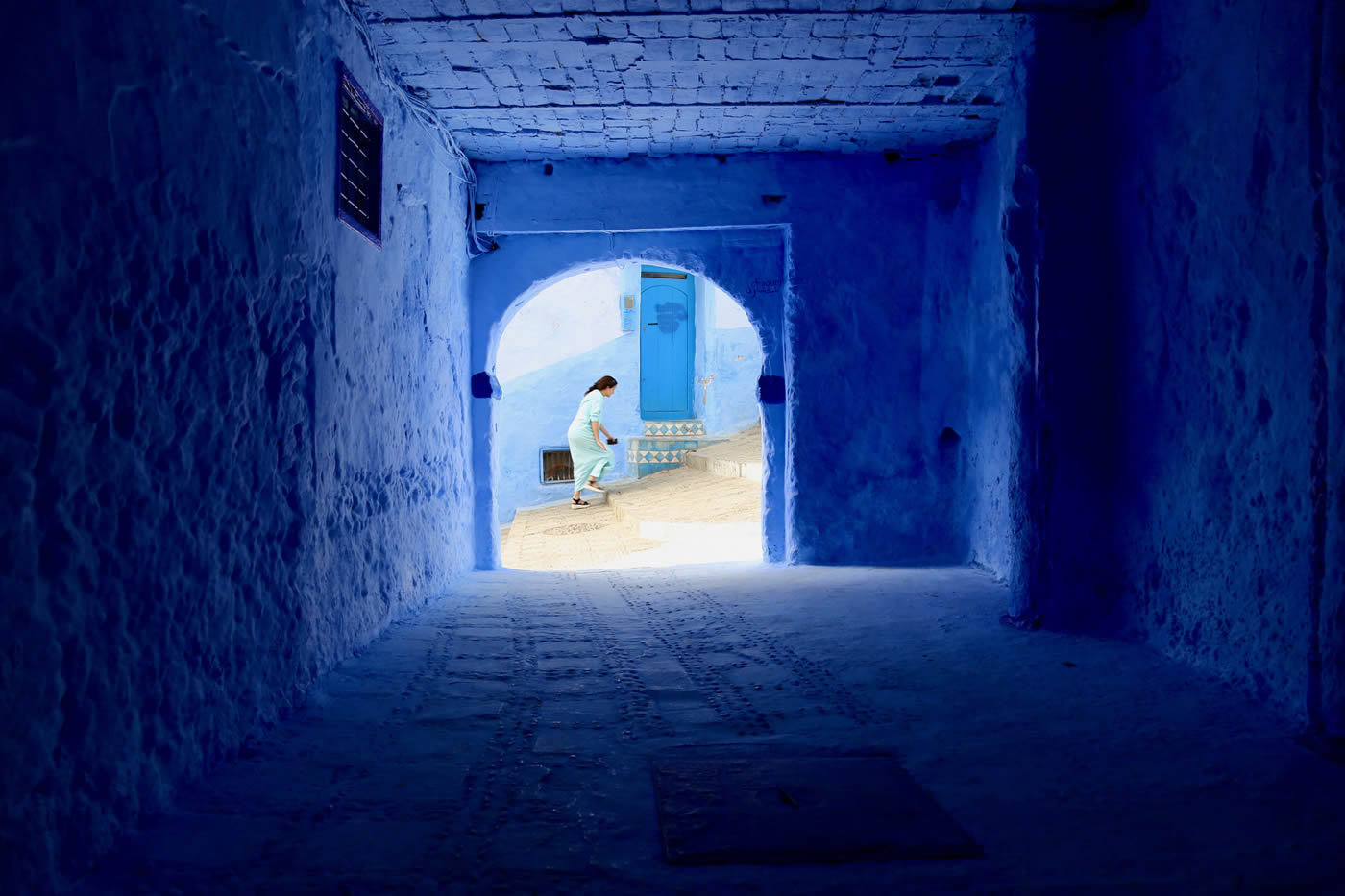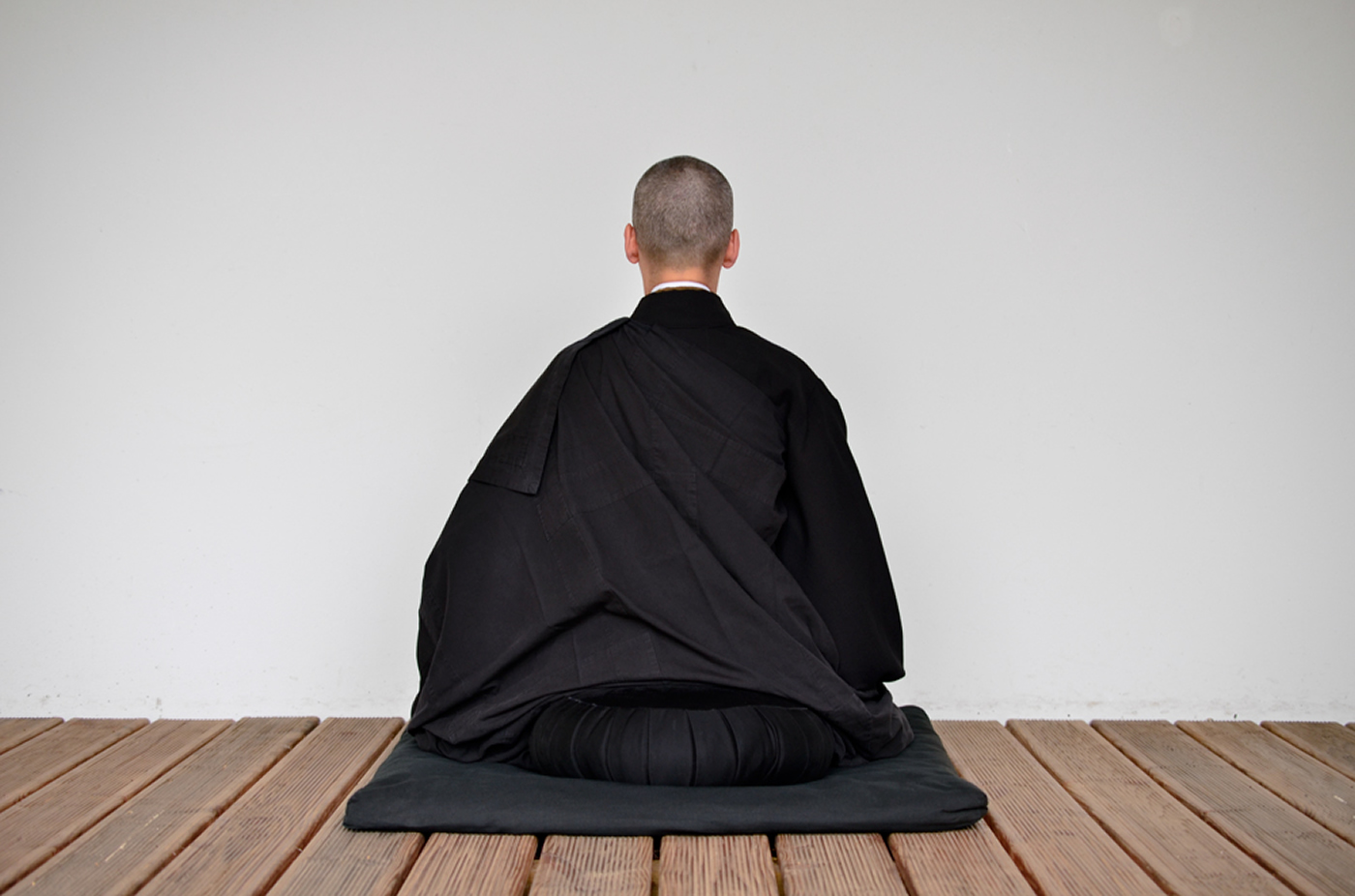Class 25: Review
[su_icon icon=”icon: link” color=”#ff1259″ size=”20″ shape_size=”12″ url=”https://youtu.be/0L7DaIxDV0s?t=4s” target=”blank”]Video[/su_icon]Hi, welcome back to the last session–[Yay!!!]–of the at-home Wheel of Life retreat. We’ve been through a pretty major amount of the lam rim (LAM RIM), in twenty-four different sessions. And probably as you remember, we’ve looked at a lot of pictures or images as we went through. And in English we have an expression: one picture is worth a thousand words. So what I’d like to do in this last class, out of all the many pictures that we used in these twenty-four sessions so far–I chose twelve, and these are the most important pictures from this whole course.
You can sort of do a self-examination here at the end. I think if you remember what these twelve pictures represent, then you are remembering all the important points of this whole course. I have a special nickname I gave to these pictures. I call them idim, which is I-D-I-M. That’s a short word for “idea image.” They also say Chinese language characters, some people say why Chinese people are so smart, except all of them. Not all of them, I mean. Just kidding. But they say that Chinese people think in pictures, in a way. And I think it’s kind of true. So I want you to think in pictures. I’m not going to make it too many. Just twelve.
I’ve been teaching this lam rim for ten years. I think we have another six years to go for this book. Then dessert. How many? We said thirteen years, Tim? Yeah, thirteen years dessert, if you want–shamatha and vipashyana dessert for thirteen more years. And what I’ve done is I’ve collected together images from all of those ten years. And we’ll be doing some separate videos about those images. If you can remember all of those images from the last ten years, then even if you couldn’t come to every lam rim retreat–we had thirty-four already–pretty much you would understand the content. Okay, let’s get going through these twelve idims.
1. “Activation, Priorities, Earlier, Habit, Closer, Serious

The first picture you see here, it’s a guy doing something to a bomb. We would say he’s turning on the bomb. He’s setting the timer. Then he will run away and that bomb will explode after five minutes or something.
And one of the most important parts of this Wheel of Life course, we talked about how a seed is “triggered” or “armed” at the last minute of your life, and that’s a crucial moment in our life. The last minute of awareness of this world. In a way, we are selecting and we are waking up the seed which is going to send us into our new life–or create our new life.
The name of this first idim is “Activation, Priorities, Earlier, Habit, Closer, Serious.” There’s just four principles I want you to remember.
(1) Generally speaking, on your deathbed, the seed that will open will be the earliest one you planted. First-in, first-out. So of course we want it to be a good seed. I was trying to remember the earliest good seed I ever planted in this life. And I kind of realized that little kids don’t really care about planting good seeds. But I did enjoy making my mom happy. Generally speaking as we die, hopefully the earlier good seeds we planted should open.
(2) But there’s an exception to that rule. If later in your life, you had a good habit and you did something over, and over, and over again, then that seed will move up in front of the line to that other seed and it will open first.
(3) Unless–and here we went to the Abhidharma literature, it’s possible for a very emotional moment at the end of your life to come first in line. And that’s why we try to encourage our loved ones to have good thoughts as they die.
(4) But if they did some very huge good deed in their life, like they saw emptiness directly, or they had an experience of love for all beings in the universe, then that seed will take over when we die.
So I what I want you to remember when you see this picture, this idim, I want you to think about the good things you did in your life, and especially try to remember the biggest, biggest good things you did.
2. Peacefully Reminding Them of Good–During and After

The second of the twelve idims for this course, is a picture of a woman making a phone call, and there’s a piece of glass next to her. The name of the idim is “Peacefully Reminding Them of Good–During and After.” It means, while your loved one is in the hospital dying–for my dad, he was very ill for about six weeks, so I took the chance to remind him of all the good things he did in his life. “Dad, what was the earliest good thing you remember that you did? Or did you go through a part of your life where you did a certain good thing over and over for a couple years? Or is there some special thing you could think about right now that would be a really good karma? And Dad, what was the best thing you ever did?” Then dad passed.
And the second half of this idim is that you can talk to dead people. They are in the bardo (BAR DO). We found out they have special powers at that time–they can hear you and they can even see you, like looking through a glass, but they cannot touch you or talk to you. So keep talking to them. You can help them. It’s called jang chok (BYANG CHOG). Just keep talking to them about all the good things they did. You can do a very powerful good deed to help your loved ones to take a good rebirth.
3. A Blueprint for Pain
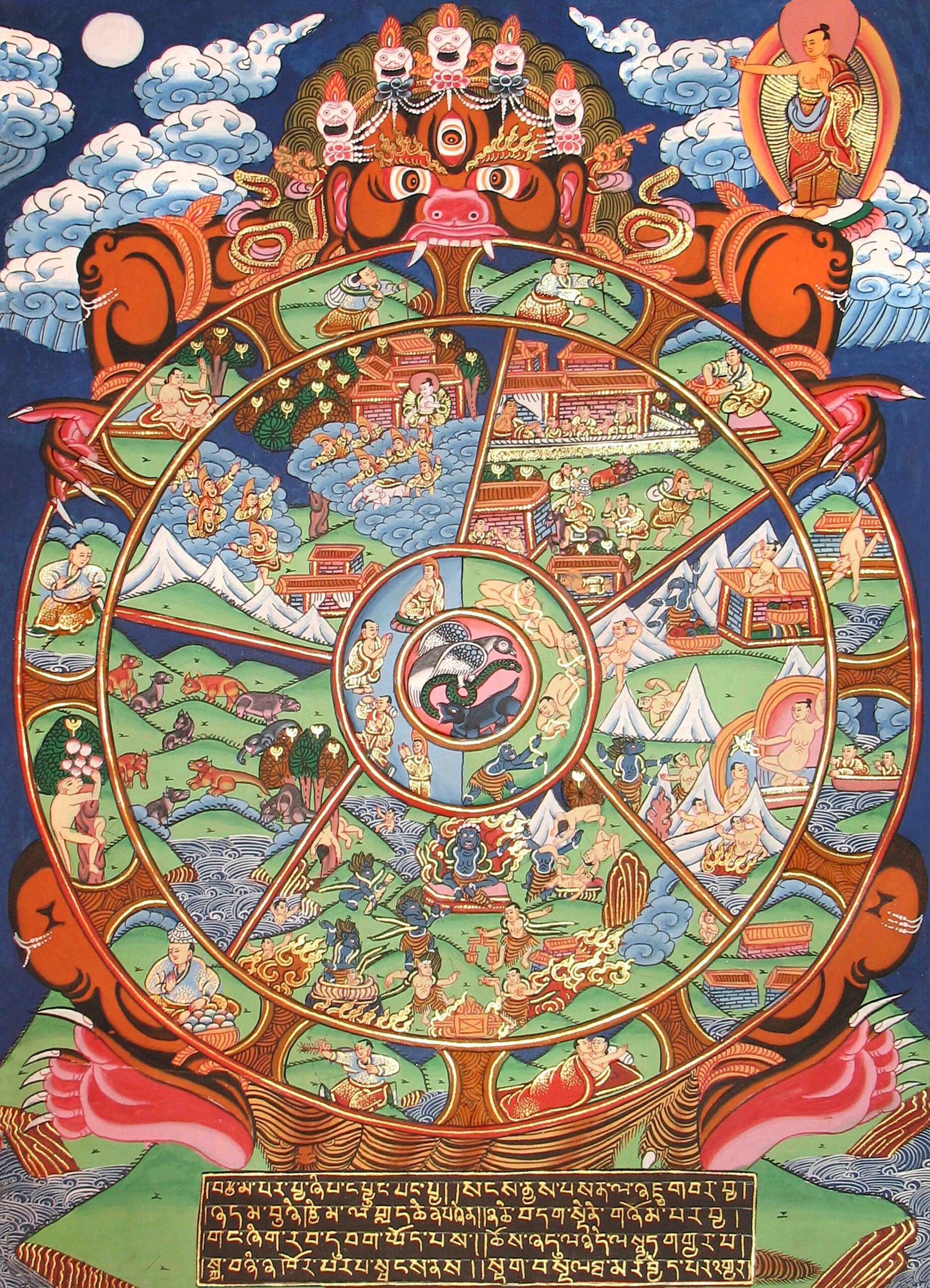
The next item I’d like to use is a picture of the Wheel of Life. I call it a “Blueprint for Pain.” It includes all the secrets about why do we have trouble in this life, why do we have to die. We focused on the twelve links around the outside of the circle.
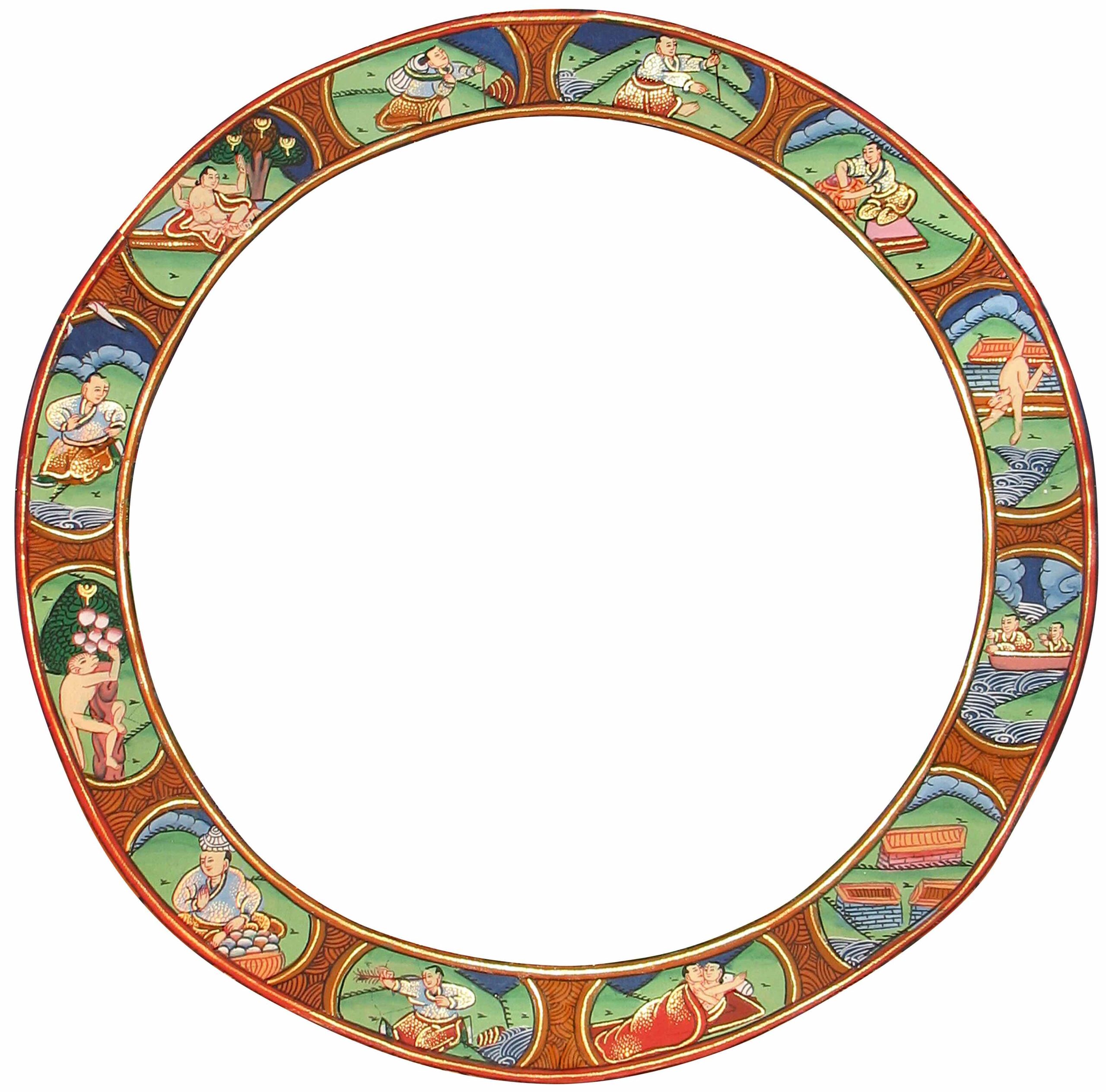
And there’s really three of the twelve links that I want you to particularly remember. Remember, link number one is the big trouble.

What is it in the kitchen? Yeah, “He’s yelling at me. I didn’t do anything!” That’s a misunderstanding. That plants a bad seed. Then if you don’t study more, if you don’t practice more, that seed will get water and fertilizer at link number eight and link number nine. And it will take you to a bad place.

So first of all, never never think “I didn’t do anything.” Everything in your life is coming from what you did. And be careful to keep (1) studying emptiness, keep (2) studying vipashyana, keep studying shamatha meditation, and (3) keep doing good things for other people. And those three have a kind of power to block your bad seeds and help your good seeds open.
4. A Seed Opening into a Sprout

Okay idim number four. We did not cover this one–the picture–during the course. But I got this picture separately. It shows a seed opening into a sprout. And I chose it because I want you to remember the Shalistambha Sutra [Śālistamba sūtra]. The “Sprout of Rice Sutra.” This is the famous source of the teaching on the links. And when you see this idim, this picture, please, I want you to remember the opening lines of that sutra for the idea of dependence.
Buddha said, “If this thing is here, then that thing is going to happen.” Cause and effect. 因果 Yīnguǒ. That’s all. If this is here, that’s going to happen. If you ever think to blame another person for your problems, then you are making karma, which will cause you to suffer. Okay, so this seed and this sprout, it’s a reminder of the sutra where the Buddha first said, “everything is your fault.” Don’t blame other people for your problems. Fix your problems.
5. If You Are Blind, You’re Going to Hit Your Head

you’re going to hit your head
Okay, idim number five. I chose a picture of my dog. I took that picture two or three days ago. And something happened to him. He got blind and deaf and also his smell doesn’t work–within one week. He is always walking around the house and he hits his head.
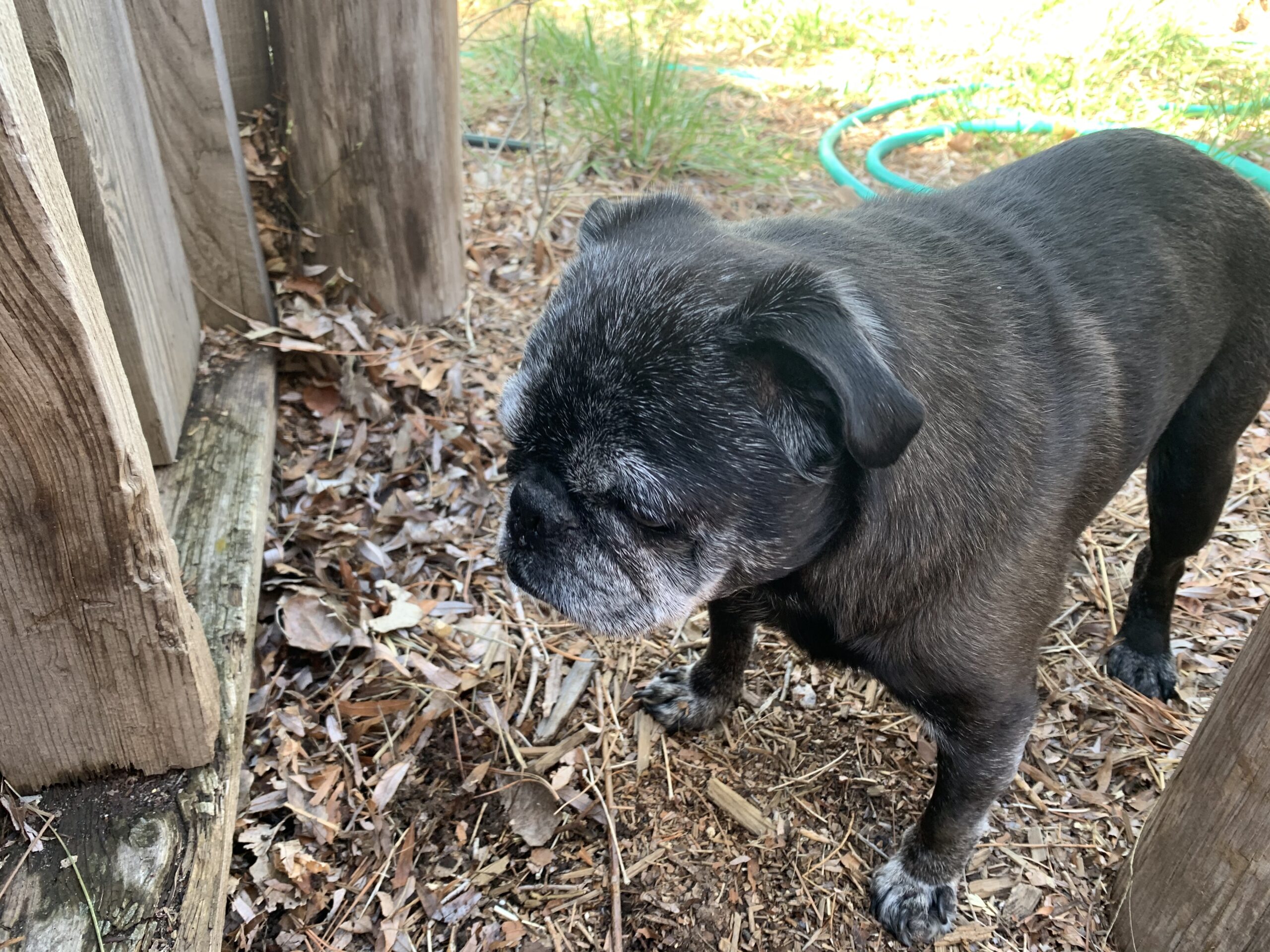
You can see he has a flat head. So that’s lucky. We put pillows everywhere, but still he finds some place to hit his head. What this idim represents to me, is if you are blind, you’re going to hit your head. Which means, “I didn’t do anything!” Then you’re going to hit your head. You’re going to get trouble. All of us have problems, all of us meet people we don’t like. All of us have bad experiences with people we don’t like, but if you understand this course, you will think, “I must have planted this.”
And what’s your action plan after you understand “I planted this”? Extremely simple. What the other person is doing that you don’t like, stop doing it yourself and they will go away. So you don’t need a lot of philosophy. Any bad things that happen to you, especially problems with other people, choose what it is that you don’t like the most about this. And your action plan: stop doing that thing yourself. Don’t worry about the other person. If you stop doing that thing yourself, they will move away. They will die. They will become your friend. Something will happen. Okay, next idim.
6. It’s Not as Easy as Shakespeare’s Stages

I have Shakespeare here, and I have a picture of a bunch of cogs or gears. And the name of the idim is “It’s Not as Easy as Shakespeare’s Stages.” What I mean is, we’re referring to a famous quotation from Shakespeare about the stages of a person’s life. And really, it’s very, very powerful poetry. I think it’s some of the only Buddhist writing in English ever. And he says look, everyone goes through the same stages.
First there’s a little kid pooping everywhere. Then they’re romantic, they fall in love with all the girls or boys. Then they become a patriot and they want to fight the other countries. Then they get rich and fat if they survive the war. Then they become again like a kid–stupid, can’t remember anything, body is very weak, and then they die. And Shakespeare says everybody’s story is this. So that part is good, I like Shakespeare for that. But don’t think our Wheel of Life is like that Shakespeare. Why?
We are not talking about twelve stages of human life. We’re talking about stage one trigger another wheel, stage two trigger another wheel, stage three trigger another wheel, another wheel trigger, another wheel trigger … trigger, trigger, trigger … all kinds of wheels going. Everything you do is going to trigger a hundred other things. It’s not that you go through one wheel in your life. In fact, we said it’s impossible to finish a wheel in one life. At least two lives. Maximum three lives, but it means maximum of a thousand different wheels.
7. Army Landmine–Radiation not Sunlight
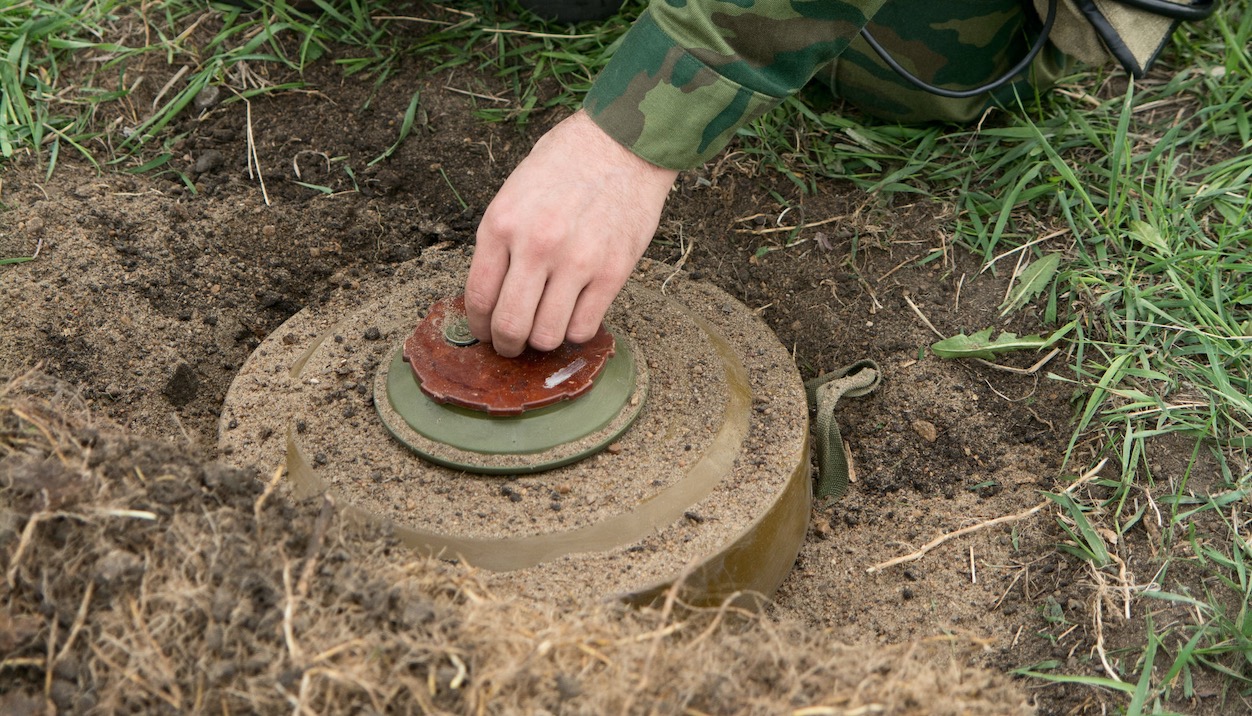
Okay the next idim, which is number seven here, a guy is turning on a landmine and he hopes his enemy will step on it one week later. And the principal I want you to remember from this picture–it says “Army Landmine–Radiation not Sunlight.” And what does it mean? It’s very simple.
When you do coffee meditation at night, thinking about the good seed that you planted when you helped somebody, that happy feeling is like sunlight, and that seed will grow faster and bigger. And very interesting. The more you understand seeds and you think about seeds during coffee meditation, they will open faster also.
Do you know the four steps to plant a good karma? “Yeah, I do.” Oh well, that knowledge is like sunlight on all your good seeds. They are going to grow faster than the other person who doesn’t understand them. Do you understand the four laws of karma? “Yeah, yeah I do.” Well then that’s like sunlight on your good seeds, they’re going to grow faster. Do you understand the four flowers? Or how seeds open? And like that. Understand that the more you understand about seeds, the more sunlight goes on those seeds and the faster they grow.
So keep studying, keep studying, keep studying. The Knowledge Base has over five thousand free talks and things to read. Do a little bit everyday. Do ten minutes. Then all your good karmas are going to open faster. If you don’t, then it is like radiation. It’s going to kill your good seeds. It won’t turn on the bomb. It will turn off the bomb–the good bomb. Ok, next picture.
8. Three Sets of Twelve Links
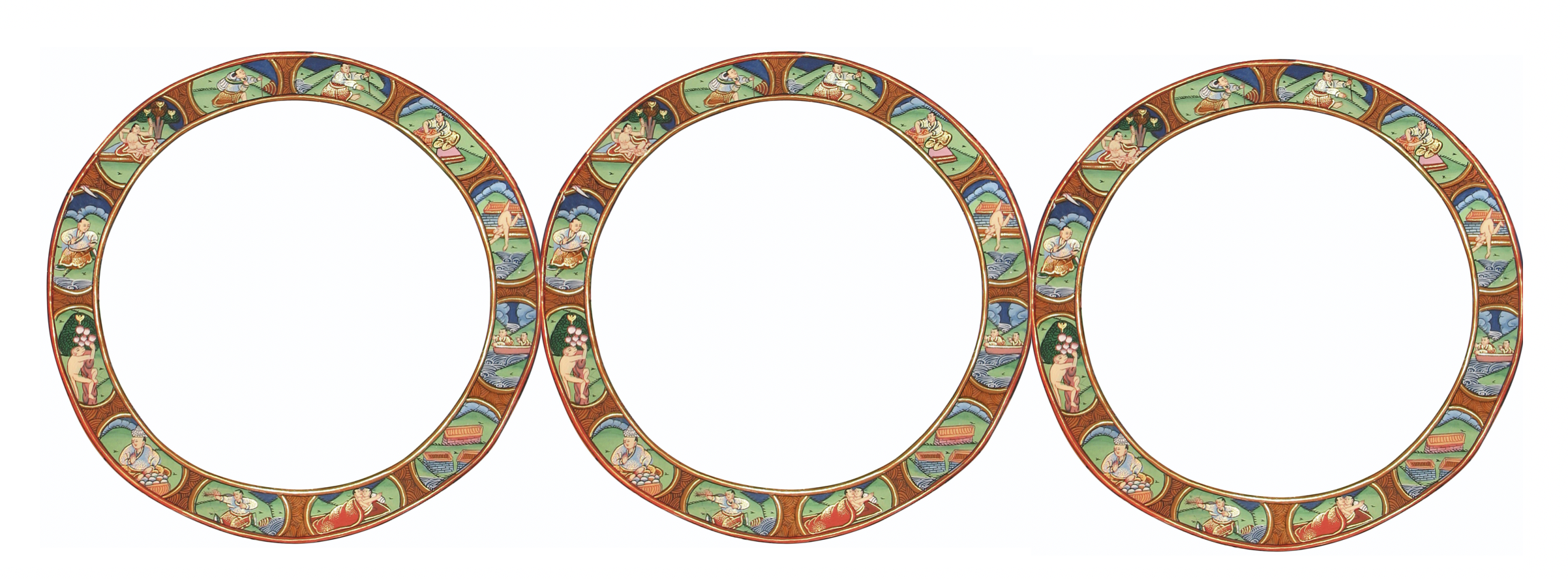
This is three sets of the twelve links. It’s a very simple principle, I don’t have to talk about it much. Each time you start this wheel spinning, even before the whole wheel spins, it will touch another wheel and start another one. So this is kind of like all the cogs in the watch that we showed with Shakespeare. Watch my hands …[spinning wheel sounds] there’s many wheels going on at the same time. So don’t start them–the bad ones.
9. A Downward Staircase: The Wheel of Life Tends to Spin Itself
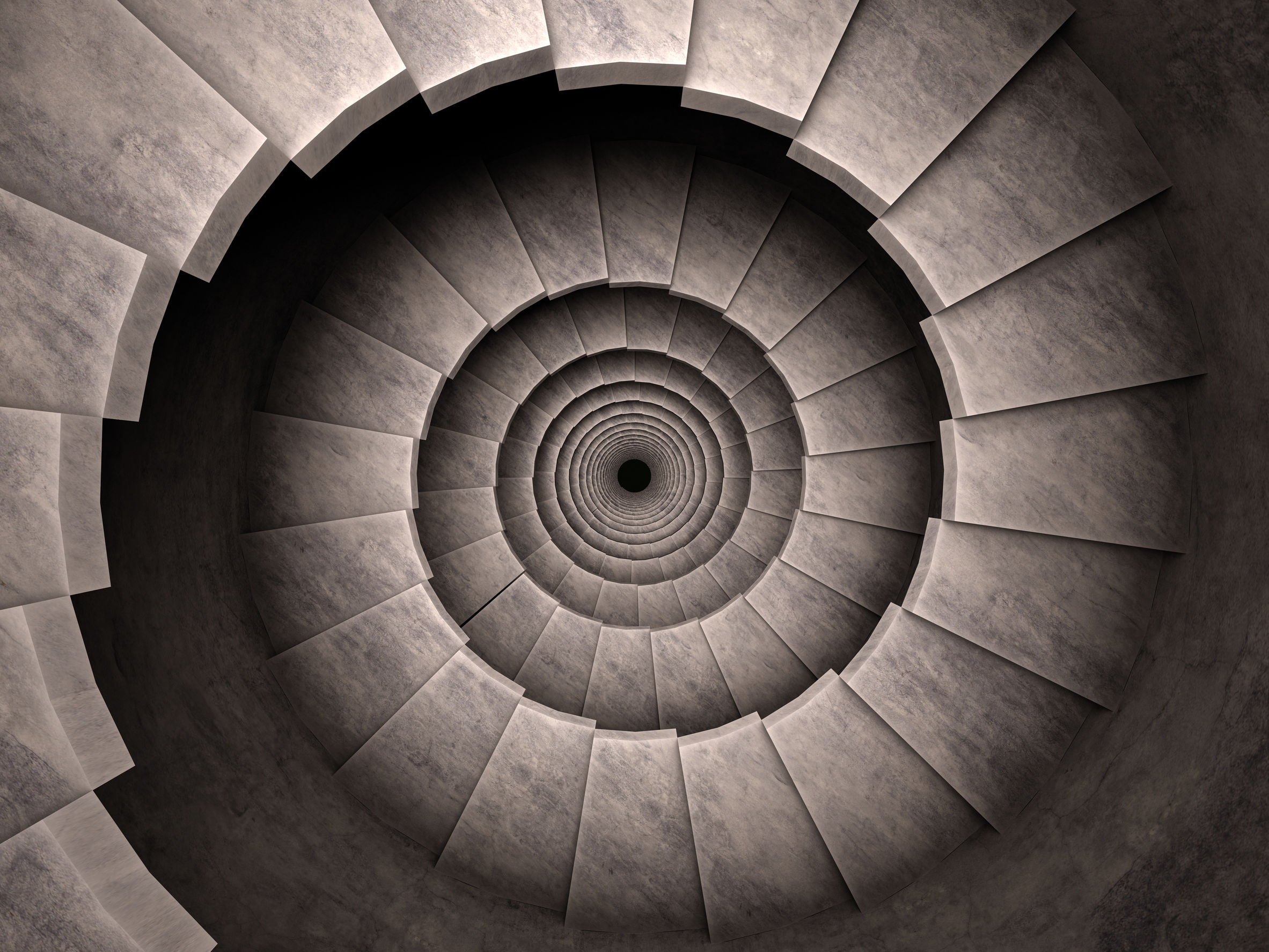
Okay, the next idim we have here, number nine, it’s a downward staircase. Actually this comes from a short description by Nagarjuna. The tendency of the wheel is to spin off another wheel. You have one of those three links, which are negative thoughts, mis-understanding, then be happy you did a bad thing. Then misunderstand seeds in general. They trigger two kinds of karma. (1) Fresh karma and (2) ripe karma. Then those trigger normal human life.
Seven steps from when your mind enters your mom up to the time you die but, unfortunately, during those seven, you are doing the first three again. Therefore the Wheel of Life tends to spin itself. And that’s the meaning of the staircase.
10. If you don’t realize you’re in the jail, you don’t want to get out of the jail

Idim number ten is a person in a jail. If you succeed in this course, I think you should start to feel some panic. Right now we have the virus going around. In our town, the first person got it yesterday. You can feel the panic and you can–I don’t know, you feel this panic in all the people. I think even animals, like the birds and the dog, they also feel there is something going on. And right now only the Buddhist people
in our town have a peaceful mind. Why am I talking about that?
If you really understand the Wheel of Life, part of you should be panic. You should feel uncomfortable all the time. Nothing here is going to go well. If I get married, if I have kids, if I make money, if I buy a house, if I go to the gym and work out, time–in the wheel–will destroy all of those things. I will lose my kids or they will lose me. Will lose my husband or wife, or they will lose me. Will lose my home. Will lose my body.
Then on one level, you should feel a little bit panicked to be inside this wheel. This picture of a guy in it, this is a modern jail, okay, it’s not these bars anymore. I chose the picture for two reasons. (1) he’s obviously in a jail, he can’t get out. But (2), it felt to me like he was depressed also. I used to teach in the jail. We started many years ago. We’ve been helping prisoners with the ACI courses for about twenty-five years.
And when you teach them the four steps in the jail, you don’t have to ask them what their goal is with the four steps. I used to ask them, “Oh, so you learned the four steps, right?” “Yeah.” “What are you using it for?” They’re not going to say money. Or girlfriend. Or muscles. They just say, “I want to get out.” And by the way, many prisoners succeeded to get their sentence shorter by using the four steps. So this picture– famous, famous, famous, lam rim saying: If you don’t realize you’re in the jail, you don’t want to get out of the jail.
11. 3 Practices to get out of the wheel

Okay, the next picture, a strong guy, looks like Stanley, just kidding, with an axe. That represents the three kinds of practices we’re going to use to get out of the wheel. In this example, the wheel is like a big tree that you want to get rid of. The sharp axe is your understanding of emptiness and dependent origination. What are those two things in the kitchen? “Oh, there is no husband in the kitchen that doesn’t come from me. Oh, my husband is yelling at me because I yelled at my kids.” That’s perfect emptiness and dependent origination. I’m not making it simple. I’m making it deep. That is real emptiness and real dependent origination. Hundred percent. So for this big job to get out of this wheel, we’re going to need three things.
(1) A big axe, which is you studied the lam rim very well.
(2) Then, focus–because if you ever cut a tree, you have to hit the same place on the tree every time, otherwise it won’t fall down. That’s shamatha. What is shamatha? Very deep. What is it? Meditate every day! Shut up and meditate. Don’t worry about “what is shamatha?” Meditate every day. Start with ten minutes. Every Sunday, increase by one minute. You will get to shamatha.
(3) Then you need strong arms. That’s you’re treating other people nicely. Not hurting other people.
12. If your hair was on fire, when would you start to put it out?

“So Geshe-la, when should I start?” Well if your hair was on fire, when would you start to put it out? So don’t ask me, “Geshe-la when should I start?” “Can I start tomorrow?” Yeah, yeah. Your hair caught on fire, you should put it out tomorrow.” No, act like your hair is on fire! No, don’t say it that way, it’s wrong. It’s wrong to say “act like your hair is on fire.” “Geshe-la, how do you want me to say it?” Your hair is on fire. Right now! It’s not like it’s on fire. Your hair is on fire. So start your practice now.
By the way, okay, last thing. Most of you listening to this, I know most of you, you are Buddhist. And you have this Buddhist guilt complex. Guilty–feel guilty. “For many years Geshe-la told me to meditate
but I don’t meditate everyday. And for many years Geshe-la told us to do the six-times book but I don’t do it every day. And I still yell at my husband or my wife. The emptiness thing doesn’t really work in the kitchen.” So if you’re like me, I’ve known about all this stuff for almost fifty years. But then I just get busy and I don’t do it. Then I feel guilty. I feel uncomfortable. People say, “Oh, Geshe-la, you are a Buddhist teacher.” I’m like, “Yeah, I am a Buddhist teacher.” But inside I feel guilty. I didn’t do my book. I skipped my meditation today. I still get upset at Veronica sometimes.
So what I’m suggesting is just start small. Start now. Do a little meditation. Start over. Pretend it’s the first day you heard about Buddhism. Just quietly start all your practices again. Keep your book. Do your meditation. Try to remember “I didn’t do anything!” is wrong. I’m telling you from my personal experience, your Buddhism will go up and down. In English we have an expression: two steps forward, one step back. You practice for two days then you fail for one day. Don’t expect your Buddhism to go like this … It’s not going to go like that. I’m telling you it will go like this … Good, good, good, good, good, good, mistake.
Start again. Good, good, good, good, good, good, mistake. And the whole is going up. But it’s like this .. You will have bad days. Then just be stubborn. You’ve got to feel guilty if you don’t get back to your practice soon. For me the guilty is worse than not becoming a Buddha. You don’t have to feel guilty if you just try a little bit tomorrow. You don’t have to become Buddha in one day. Okay, you didn’t sit on your meditation seat for two weeks, and your mind is saying “Oh, I’m a bad person, I’m a bad person…” Just tell your mind, “Shut up!” Sit down on your meditation seat and start again. You’re making progress.
Okay. Good luck!
See you then. Thank you Stanley, and thank you Tim, and thank you Xiaoping.
Okay. See you later.


